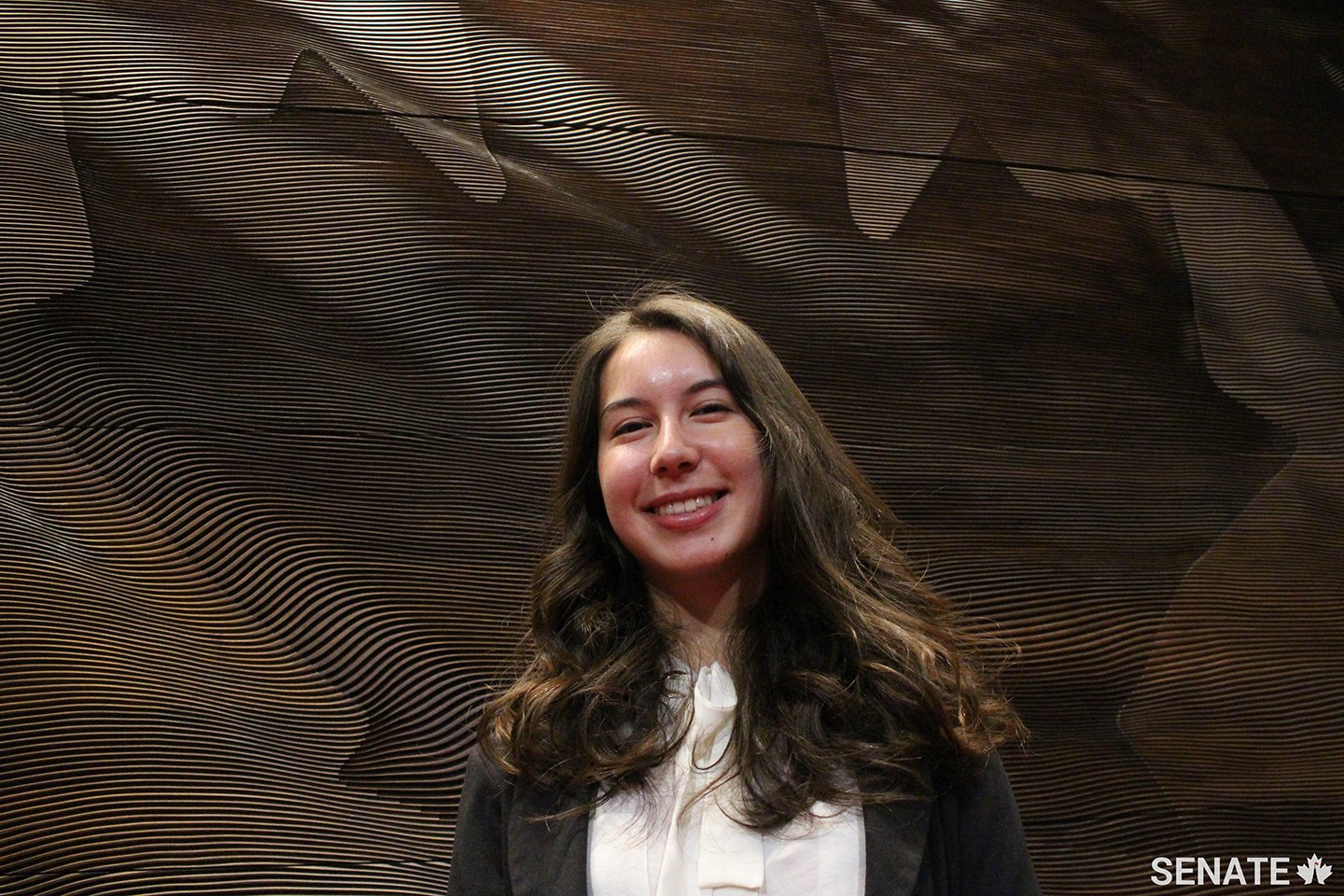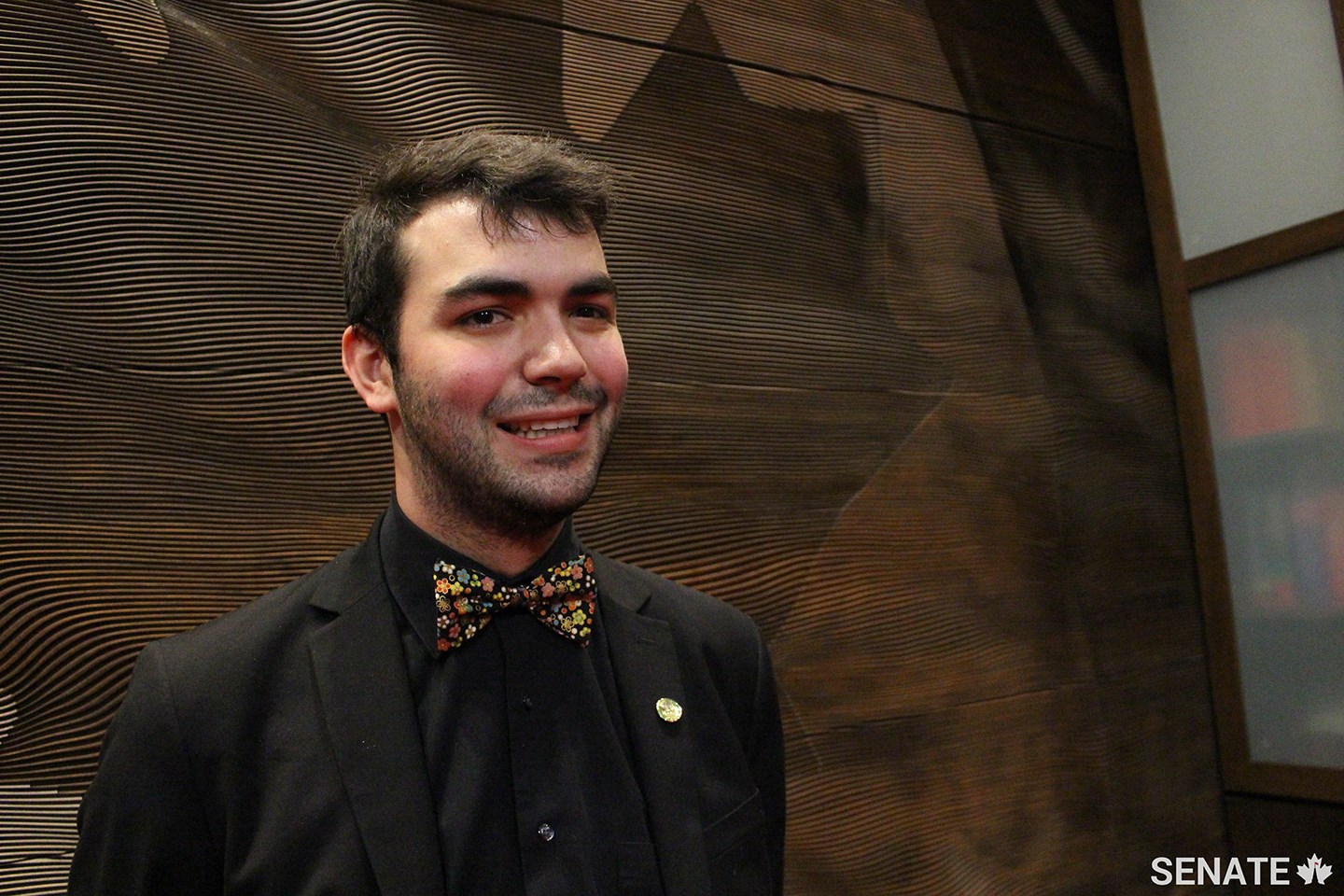Student journalists interview senators

The Red Chamber hosted its very first Model Senate in January 2020. Nearly 60 students from universities in the Ottawa-Gatineau area took part in this historic event.
Student journalists also participated at the event and received mentoring from a news reporter and communications professionals — and the chance to write an article for SenCAplus after interviewing senators.

Lost in translation: Senator Miville-Dechêne
By Rebecca Kwan
Senator Julie Miville-Dechêne would like to hear more French spoken in the Senate but said she does not believe bilingualism should be required.
“Of course, I would like to see more of my English-speaking colleagues master French,” she said.
Senator Miville-Dechêne explained that there are certain barriers to overcome when deciding to speak French in the Chamber.
“Despite the remarkable work interpreters do, it’s not as easy or interesting to listen to a translation. If we want to have a real debate where only one language is used, there’s a temptation to speak English in order to capture the attention of the majority of senators, those who do not speak French.”
Senator Miville-Dechêne added that she uses English more often at committee meetings, especially if a witness is English-speaking, as a matter of courtesy.
“I turn to English on occasion when I have an important message to convey and I want it to get through without the filter of translation. It’s essential to have an effective way to convey your message.”
However, the senator said she does not hesitate to continue the discussion in French when she feels like it — to talk about more technical subjects, for instance.
In an interview conducted as part of the Senate’s first simulation, she also took the time to highlight how important this type of activity is to young people.
“I have spent my life communicating, trying to share the most accurate information on the issues of the day so that people can form their own opinions. That’s been my passion — striving to give people enough tools to think about things and make the right decisions.”

Maximizing natural resources could slow Newfoundland’s outmigration: Senator Wells
By Zachary Robichaud
Newfoundland and Labrador must capitalize on its natural resources if the province wants to stem the outpouring of young people to other parts of Canada, Senator David Wells said.
The province has been grappling with outmigration for decades, and many of those who leave cite that the main reason for their departure is to find better employment.
“Around the world, people will always leave for greater opportunity. Our job is to ensure the greater opportunity is at home,” said Senator Wells, who represents Newfoundland and Labrador in the Red Chamber.
“Canada was built on natural resources,” he said. “In the early days it was fish and fur. Now it is mining, forestry and petroleum. If we can responsibly prosecute those and other resources at home, people will get to stay home.”
Well-paying jobs strengthen communities, allowing people to remain living near their family and friends, the senator said.
Newfoundland and Labrador’s economy has been a key focus for Senator Wells. Before serving as a senator, he built a career in business including work with the oil industry, fisheries and resource management.
“We have opportunities in all sectors, but we are a natural resource-based economy,” he said.
Senator Wells warned that Newfoundlanders and Labradorians should be mindful of those who argue against harvesting trees, extracting minerals or catching fish.
“In many families and communities, it has a damaging effect because it is distant groups telling others who often have few opportunities that they shouldn’t do something,” he said.
“If it can be done responsibly, then it should be done.”
Fighting for the human rights of prisoners: Senator Pate
By Rebecca Kwan, Davis Legree and Zachary Robichaud
Known for her compassion and advocacy for prisoners, Senator Kim Pate started life with a tough-on-crime mentality.
“As a kid, I was raised working class. I was raised, ‘You do the crime, you do the time,’” she said. “Certainly when I was in university I would’ve still said I believe in capital punishment. You can imagine that’s nowhere near my view now.”
As she learned more about prisons, she became convinced that the status quo simply wasn’t working.
Today, Senator Pate works to increase substantive equality so that fewer poor, racialized and disabled people are imprisoned. She also works to get people out of prisons and into the community with economic, housing, employment, educational, mental health and other personal supports, rather than merely trying to “fix” prisons.
Prisons for women, for example, weren’t conceived to be the cold, walled-off and isolated institutions they have become.
“The federal prisons for women that exist … were supposed to be integrated into communities when they were built. They were not supposed to have fences, the community was supposed to come in and participate through programs and services,” Senator Pate said.
In fact, many prisons for women were built with gymnasiums at what were originally the front entrances. The idea was that community members could use the gyms and even share them with prisoners through sports events.
“If the community knows who’s there, there’s a greater ability to integrate people. And people who have communities of support are more likely to go back into the community and not be in trouble again,” Senator Pate said.
“It humanizes prisoners as well.”
Indeed, a recurring theme among people she has brought to visit prisons has been surprise — surprise at the kinship they feel for the people locked inside.
“Every person will usually say something like, ‘That’s not what I expected — they were like my brother, my sister, my mom, my aunt, my grandmother.’”
She understands those who say that if you do something wrong you should be incarcerated.
“But if you just ask the next question — what do you want that to achieve — almost everyone will respond with something that suggests we should be doing something different.”

Classroom was good training for Senate leadership: Senator Martin
By Davis Legree
Senator Yonah Martin’s path to leadership in the Senate was forged during two decades in the classroom.
Now Deputy Leader of the Opposition in the Senate, Senator Martin was appointed to the Red Chamber in 2009 by then-prime minister Stephen Harper after a career as a teacher.
When she arrived in Ottawa, Senator Martin said she saw “incredible colleagues” with expertise in politics and law; she wasn’t sure how her professional background would translate into her new reality in the political arena.
It wouldn’t take her long to find out.
Within two years she became Deputy Whip of the Government, and after that, Deputy Leader of the Government in the Senate.
“The role of deputy leader of the government was an especially daunting one,” she said. “My experience as a teacher really helped me.”
Lessons learned in the classroom, like managing different personalities, conflict resolution and organization, were directly transferable to her Senate roles.
“Plus, the classroom is your stage, so you have to be an effective communicator,” she said. “You have to be able to take your main aims and make sure it’s as exciting and dynamic to your class as you can make it, even on a late Friday afternoon.”
Now a veteran of the Senate, Senator Martin doesn’t forget what it is to be a student of Parliament, which she said shapes her approach to new senators.
“On my first day, I remember seeing all these people I’d seen on TV in the anteroom before we went into the big caucus meeting,” she recalled.
“I was so nervous. I was in the corner trying not to shake my coffee and look like I fit in.”
Then she noticed someone making a beeline for her. It was former senator Don Oliver.
“He said, ‘I’ve been waiting for you. I’m the first Black, male senator on Parliament Hill and I can’t wait to work with you on the diversity file,’” Senator Martin said.
“I will never forget him saying to me, ‘I’ve been waiting for you.’”
That spirit guides how Senator Martin says she welcomes new colleagues.
“We can do so much in our position,” she said, echoing what other senators have said to her. “Be patient. You will know, in time, what cause, issue or group you are called to champion.”
Related articles
Tags
Committee news
Student journalists interview senators

The Red Chamber hosted its very first Model Senate in January 2020. Nearly 60 students from universities in the Ottawa-Gatineau area took part in this historic event.
Student journalists also participated at the event and received mentoring from a news reporter and communications professionals — and the chance to write an article for SenCAplus after interviewing senators.

Lost in translation: Senator Miville-Dechêne
By Rebecca Kwan
Senator Julie Miville-Dechêne would like to hear more French spoken in the Senate but said she does not believe bilingualism should be required.
“Of course, I would like to see more of my English-speaking colleagues master French,” she said.
Senator Miville-Dechêne explained that there are certain barriers to overcome when deciding to speak French in the Chamber.
“Despite the remarkable work interpreters do, it’s not as easy or interesting to listen to a translation. If we want to have a real debate where only one language is used, there’s a temptation to speak English in order to capture the attention of the majority of senators, those who do not speak French.”
Senator Miville-Dechêne added that she uses English more often at committee meetings, especially if a witness is English-speaking, as a matter of courtesy.
“I turn to English on occasion when I have an important message to convey and I want it to get through without the filter of translation. It’s essential to have an effective way to convey your message.”
However, the senator said she does not hesitate to continue the discussion in French when she feels like it — to talk about more technical subjects, for instance.
In an interview conducted as part of the Senate’s first simulation, she also took the time to highlight how important this type of activity is to young people.
“I have spent my life communicating, trying to share the most accurate information on the issues of the day so that people can form their own opinions. That’s been my passion — striving to give people enough tools to think about things and make the right decisions.”

Maximizing natural resources could slow Newfoundland’s outmigration: Senator Wells
By Zachary Robichaud
Newfoundland and Labrador must capitalize on its natural resources if the province wants to stem the outpouring of young people to other parts of Canada, Senator David Wells said.
The province has been grappling with outmigration for decades, and many of those who leave cite that the main reason for their departure is to find better employment.
“Around the world, people will always leave for greater opportunity. Our job is to ensure the greater opportunity is at home,” said Senator Wells, who represents Newfoundland and Labrador in the Red Chamber.
“Canada was built on natural resources,” he said. “In the early days it was fish and fur. Now it is mining, forestry and petroleum. If we can responsibly prosecute those and other resources at home, people will get to stay home.”
Well-paying jobs strengthen communities, allowing people to remain living near their family and friends, the senator said.
Newfoundland and Labrador’s economy has been a key focus for Senator Wells. Before serving as a senator, he built a career in business including work with the oil industry, fisheries and resource management.
“We have opportunities in all sectors, but we are a natural resource-based economy,” he said.
Senator Wells warned that Newfoundlanders and Labradorians should be mindful of those who argue against harvesting trees, extracting minerals or catching fish.
“In many families and communities, it has a damaging effect because it is distant groups telling others who often have few opportunities that they shouldn’t do something,” he said.
“If it can be done responsibly, then it should be done.”
Fighting for the human rights of prisoners: Senator Pate
By Rebecca Kwan, Davis Legree and Zachary Robichaud
Known for her compassion and advocacy for prisoners, Senator Kim Pate started life with a tough-on-crime mentality.
“As a kid, I was raised working class. I was raised, ‘You do the crime, you do the time,’” she said. “Certainly when I was in university I would’ve still said I believe in capital punishment. You can imagine that’s nowhere near my view now.”
As she learned more about prisons, she became convinced that the status quo simply wasn’t working.
Today, Senator Pate works to increase substantive equality so that fewer poor, racialized and disabled people are imprisoned. She also works to get people out of prisons and into the community with economic, housing, employment, educational, mental health and other personal supports, rather than merely trying to “fix” prisons.
Prisons for women, for example, weren’t conceived to be the cold, walled-off and isolated institutions they have become.
“The federal prisons for women that exist … were supposed to be integrated into communities when they were built. They were not supposed to have fences, the community was supposed to come in and participate through programs and services,” Senator Pate said.
In fact, many prisons for women were built with gymnasiums at what were originally the front entrances. The idea was that community members could use the gyms and even share them with prisoners through sports events.
“If the community knows who’s there, there’s a greater ability to integrate people. And people who have communities of support are more likely to go back into the community and not be in trouble again,” Senator Pate said.
“It humanizes prisoners as well.”
Indeed, a recurring theme among people she has brought to visit prisons has been surprise — surprise at the kinship they feel for the people locked inside.
“Every person will usually say something like, ‘That’s not what I expected — they were like my brother, my sister, my mom, my aunt, my grandmother.’”
She understands those who say that if you do something wrong you should be incarcerated.
“But if you just ask the next question — what do you want that to achieve — almost everyone will respond with something that suggests we should be doing something different.”

Classroom was good training for Senate leadership: Senator Martin
By Davis Legree
Senator Yonah Martin’s path to leadership in the Senate was forged during two decades in the classroom.
Now Deputy Leader of the Opposition in the Senate, Senator Martin was appointed to the Red Chamber in 2009 by then-prime minister Stephen Harper after a career as a teacher.
When she arrived in Ottawa, Senator Martin said she saw “incredible colleagues” with expertise in politics and law; she wasn’t sure how her professional background would translate into her new reality in the political arena.
It wouldn’t take her long to find out.
Within two years she became Deputy Whip of the Government, and after that, Deputy Leader of the Government in the Senate.
“The role of deputy leader of the government was an especially daunting one,” she said. “My experience as a teacher really helped me.”
Lessons learned in the classroom, like managing different personalities, conflict resolution and organization, were directly transferable to her Senate roles.
“Plus, the classroom is your stage, so you have to be an effective communicator,” she said. “You have to be able to take your main aims and make sure it’s as exciting and dynamic to your class as you can make it, even on a late Friday afternoon.”
Now a veteran of the Senate, Senator Martin doesn’t forget what it is to be a student of Parliament, which she said shapes her approach to new senators.
“On my first day, I remember seeing all these people I’d seen on TV in the anteroom before we went into the big caucus meeting,” she recalled.
“I was so nervous. I was in the corner trying not to shake my coffee and look like I fit in.”
Then she noticed someone making a beeline for her. It was former senator Don Oliver.
“He said, ‘I’ve been waiting for you. I’m the first Black, male senator on Parliament Hill and I can’t wait to work with you on the diversity file,’” Senator Martin said.
“I will never forget him saying to me, ‘I’ve been waiting for you.’”
That spirit guides how Senator Martin says she welcomes new colleagues.
“We can do so much in our position,” she said, echoing what other senators have said to her. “Be patient. You will know, in time, what cause, issue or group you are called to champion.”


